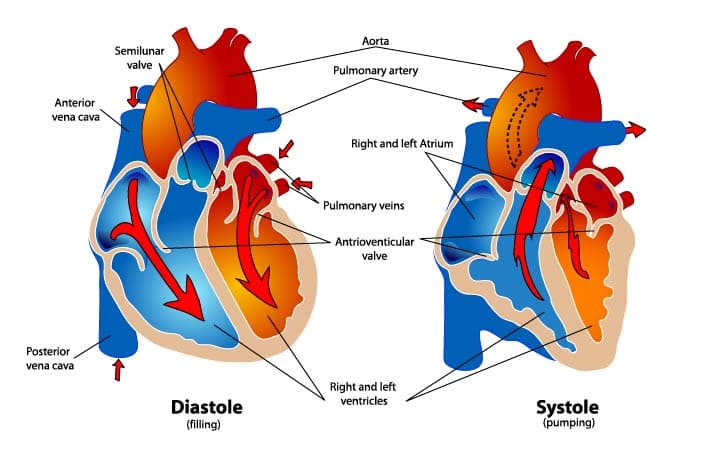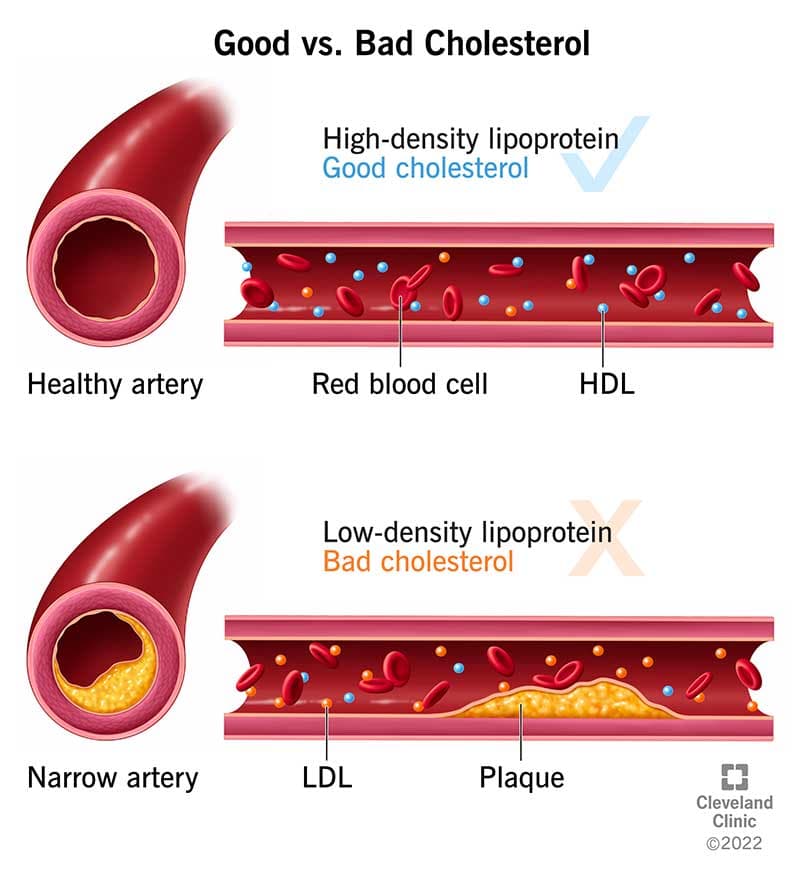
Contrary to popular belief, maintaining a healthy heart involves so much more than simply lowering levels of bad cholesterol in the body.
Before we get into the nitty gritty, let’s have a little GCSE Science refresher. The human heart is home to four chambers: the left and right atria make up the upper chamber, and the left and right ventricles are part of the lower chamber.
The right side of the heart (right atrium, right ventricle) works to pump deoxygenated blood returning from the body back to the lungs to be reoxygenated. The left side (left atrium, left ventricle) then pumps that healthy, oxygenated blood back through the body to ensure our vital organs can function.
The heart is essentially one big pump, powered by an innate electrical impulse known as the sinus node, and beats approximately 100,000 times a day, pumping around five litres of blood around the body.
So, how does cholesterol come into play, what causes high blood pressure, and why is exercise so important when it comes to maintaining a healthy heart?

CardioSecur
Cholesterol is a natural, fatty and wax-like substance which is found in all human body cells. It’s produced by the liver and is also present in many of the foods we eat. However, too much cholesterol in the blood can increase the risk of a heart attack or stroke.
Cholesterol is carried through the blood to the cells that need it through proteins. When cholesterol and proteins combine, they’re called lipoproteins.
High-density lipoproteins (known as HDL, or ‘good’ cholesterol) help to promote overall health by taking ‘bad’ cholesterol back to the liver. The liver then breaks down the bad stuff, which is eventually expelled from our bodies.
Non-high-density lipoproteins, or non-HDL, are what we call ‘bad’ cholesterol. Too much non-HDL leads to a buildup of fatty deposits inside your blood vessels, which puts strain on the heart and increases the risk of a heart attack or stroke. If a blood clot forms in a narrow vessel, it can completely block blood flow to the heart, which causes a heart attack.
Though triglycerides and cholesterol are both lipids which travel through the blood via proteins, Hypertriglyceridemia and Hypercholesterolemia are two different disorders. Both can be alleviated through a healthy diet and exercise, but must be addressed with different medications by healthcare professionals.
Blood pressure naturally oscillates, but if yours is high even when resting, then it’s a problem. This is because consistently high pressure strains the arteries, which causes them to become stiff or narrow. This makes it easier for fatty material to build up in the arteries.
“High cholesterol and high blood pressure are both common health conditions that affect the heart and blood vessels, but they are different in how they impact the body. High blood pressure is when the force (pressure) of blood against artery walls is consistently too high, straining the heart and vessels. High blood pressure can be caused by stress, poor diet, lack of exercise, obesity, smoking, or genetics. High blood pressure can be checked at home using a blood pressure monitor,” explains Shabir Daya MRPharms, co-founder of Victoria Health
High blood pressure combined with high cholesterol puts individuals at an extremely high risk of heart attack or stroke.
How to prevent the onset of heart conditions

Cleveland Clinic
Both high blood pressure and an excess of non-HDL cholesterol can be inherited conditions. However, they are also linked to not getting enough exercise, consuming an unbalanced diet, and consuming large amounts of saturated fats.
“To keep your heart and your cardiovascular system healthy, take regular exercise, maintain a healthy weight, eat a balanced diet not laden with sugar or fat with a variety of fruits and vegetables, avoid alcohol and smoking, and last but not least, manage stress effectively,” says Daya.
- Regular exercise: According to the BHF, exercise can reduce your risk of heart and circulatory diseases by up to 35 per cent.
- Healthy diet: Remember, supplementation is named as such for a reason – it’s secondary to having a balanced diet that is already rich in essential nutrients.
- Reducing general stress: Never underestimate the strain that stress in your personal or professional life can have on the overall health of your heart.
According to The British Heart Foundation’s resident dietitian, Victoria Taylor, it’s important to note three key things when it comes to taking supplements for heart health:
- Supplements cannot undo the negative effects of an unhealthy diet, and they won’t halt or help to improve diagnosed circulatory diseases.
- Some supplements can be harmful to those with poor heart health. Taylor recommends avoiding multivitamins containing a mixture of antioxidants like vitamin A, vitamin E and beta-carotene, as research shows that these do not improve cardiovascular disease and are linked to a higher risk of mortality.
- Some supplements interact with prescribed medications. Those with a particularly high risk of stroke, heart attack or pulmonary embolism might have been prescribed blood thinners (anticoagulants) such as warfarin. You cannot take supplements like vitamin K, high doses of antioxidants, omega-3 and St John’s Wort with blood thinners.
Nevertheless, there are indeed a myriad of nutritional supplements which, when combined with a balanced diet and exercise, may help to promote better heart health and offer overall immune support. These vitamins and minerals include:
- Vitamin D: May reduce inflammation and help regulate blood pressure, though more research is required.
- Magnesium: May help to lower blood pressure and support the healthy functioning of the sinus node.
- Folic acid: Once again, more research is required to understand whether folic acid can help reduce heart attacks or strokes. As a B Vitamin, it may, however, lower the levels of homocysteine in the body (an amino acid linked to heart disease).
- Vitamin B12: Also helps to reduce levels of homocysteine in the body.
- Fibre: Can potentially help lower non-HDL cholesterol by reducing the amount of it that your body absorbs.
If you’re not on blood thinners:
- Omega-3: There are three types of omega-3 fats that we collectively refer to as omega-3s: docosahexaenoic acid (DHA), eicosapentaenoic acid (EPA) and alpha-linolenic acid (ALA). EPA fats are particularly good for the heart, whilst DHA fats are good for the brain. However, prescription fish oils tend to be offered to people with severe triglyceride disorders, not high cholesterol.
- CoQ10: A naturally occurring nutrient that plays an important role in the production of energy used by our organs. According to Daya, “Studies have shown that CoQ10 works to enhance energy in all cells, including the heart muscle cells. As an antioxidant, it is reported to help protect against damage to arteries, which can get clogged up. DoSe by VH Liposomal CoQ10 provides a bioavailable form of this nutrient at a therapeutic dose. This may help to reduce the likelihood of blood clots, while increasing exercise tolerance by boosting energy.” However, an article by Johns Hopkins Medicine says that this hasn’t been proven.
Daya also warns, “People with existing heart conditions should avoid supplements with ginseng extracts as these may raise blood pressure and can interact with blood pressure medications.”
Below, you’ll find a curated selection of supplements that have been linked to better heart health. Keep scrolling to shop our top picks.
If you are concerned about your heart health or cholesterol, always consult a doctor before taking nutritional supplements, especially if you’re already taking medication daily.
